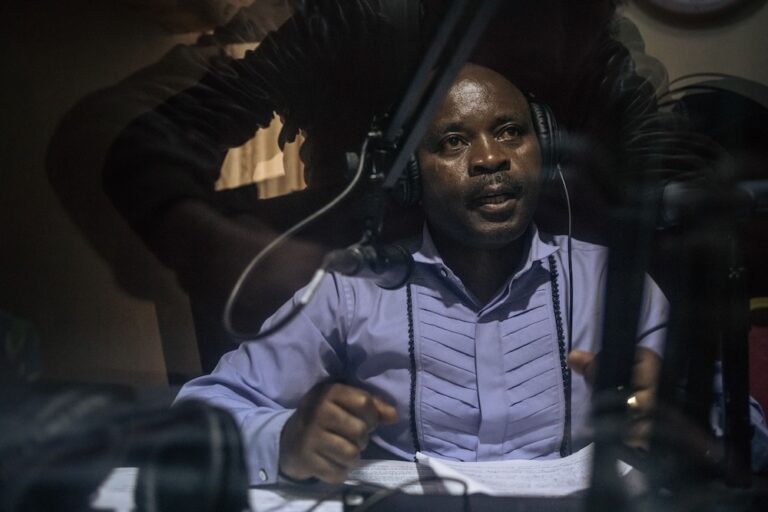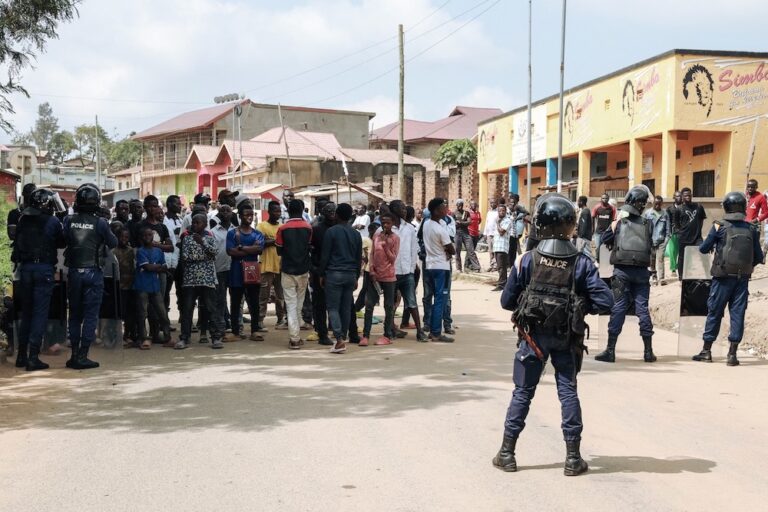(JED/IFEX) – The following is a 13 February 2004 JED press release: Journalist completes his first year in detention without trial Kinshasa, 13 February 2004 Journaliste en danger (JED), a non-governmental organisation dedicated to the defence and promotion of press freedom, and manager of the Central African Media Organisation’s (Organisation des médias d’Afrique centrale, OMAC) […]
(JED/IFEX) – The following is a 13 February 2004 JED press release:
Journalist completes his first year in detention without trial
Kinshasa, 13 February 2004
Journaliste en danger (JED), a non-governmental organisation dedicated to the defence and promotion of press freedom, and manager of the Central African Media Organisation’s (Organisation des médias d’Afrique centrale, OMAC) Alerts Network, notes that on Saturday 14 February 2004, Bamporiki Chamira, a journalist with the daily La Tempête des Tropiques, will have spent 12 months in preventive detention at Kinshasa’s Penitentiary and Reeducation Centre (Centre pénitentiaire et de rééducation de Kinshasa, CPRK, former Makala central prison).
Bamporiki Chamira and his late wife were arrested at their Kinshasa/Ngaliema residence on Friday 14 February 2003 at 6:00 a.m. by National Intelligence Agency (Agence nationale des renseignements, ANR) officers. The journalist was accused of plotting to kill President Joseph Kabila, trying to overthrow the regime in power and seeking to avenge the death of Commander Anselme Massasu. After spending 40 days imprisoned in ANR cells, Chamira was brought before the State Security Court (Cour de Sûreté de l’Etat, CSE) on 25 March 2003 and was subsequently transferred to the fomer Makala central prison.
His trial started on Tuesday 17 June 2003 at the CSE, where he was formally charged with “direct or indirect participation in a plot aimed at eliminating President Joseph Kabila and direct or indirect participation in Commander Doris Mbenge’s escape from an ANR cell”.
During the pretrial investigation of the case, the journalist’s defence lawyer, Diku Dieudonné, asked the prosecution to list the facts proving that his client had participated in a plot. The lawyer for the prosecution responded that at 1:00 a.m. on the day of Commander Mbenge’s escape, Chamira spoke by telephone with his daughter, who is Mbenge’s wife. The defence lawyer said the prosecution’s testimony presupposed that Chamira’s telephone was tapped, and that consequently it should have been possible to prevent Commander Mbenge’s escape.
The court recessed at the conclusion of the 24 June 2003 hearing. By December 2003, the CSE had still not delivered a verdict in the case, in violation of the law stipulating that a verdict must be issued within eight days of the conclusion of court proceedings. Finally, in January 2004, the court decided to examine the defence lawyer’s accusation that Chamira should have been released at the time of the 15 April 2003 general amnesty. Three new hearings in the case have since taken place.
JED recognises that Chamira did not commit a press offense and that he is being tried for a common law crime. However, the organisation still wishes to draw attention to the numerous irregularities that have characterised the case to date, in contempt of the DR Congo’s commitments with respect to human rights.
JED wishes to highlight the follow irregularities:
1. With regard to the overall circumstances of the case:
– There is no legal basis for Chamira’s extended stay in preventive detention, which should only be used in particular instances and cannot constitute a sentence in and of itself. His situation violates Article 28 of the Code of Criminal Procedure.
– Nothing can justify the judge’s refusal to grant Chamira a provisional release, since there is no reason to expect that he will flee. He has a residence, is gainfully employed and has idetnification documents issued by the authorities. As such, the judge’s refusal violates the relevant section of Article 32 of the Code of Criminal Procedure.
– Following the court recess at the conclusion of the 24 June 2003 hearing, no verdict was delivered in the case, in violation of Article 80 of the Code of Criminal Procedure, which stipulates that a verdict must be issued within eight days of the conclusion of court proceedings.
– The subsequent relaunch of court proceedings was nothing more than a tactic to conceal the violation of Article 80 of the Code of Criminal Procedure following the 24 June 2003 hearing.
2. With regard to the substance of the case:
– No reasonable explanation was given to explain why two key witnesses never appeared in court, in violation of Article 78 of the Code of Criminal Procedure, which allows the judge to sentence absentee witnesses to one month in prison or a fine, or both. Why has the judge not done this, if only to ensure that the powers granted to him by law are respected?
– No proof was ever brought forward to back the charges against the journalist.
3. A violation of basic rights:
It is clear from all the facts articulated above that Chamira is being deprived of his freedom unfairly, in violation of Article 15 of the country’s transition Constitution.
JED recalls and reiterates its request that Chamira be granted a presidential pardon, if only on humnanitarian grounds. A delegation of executives from Kinshasa’s main newspapers and JED first made the appeal on 5 May 2003, via then justice minister Ngele Masudi, on the occasion of celebrations marking World Press Fredom Day. In the course of his long detention, the journalist’s wife passed away and his young children have since been living in very difficult circumstances.
FOR JOURNALISTE EN DANGER (JED)
Tshivis T. Tshivuadi
Secretary-General
D. M’Baya Tshimanga
President


